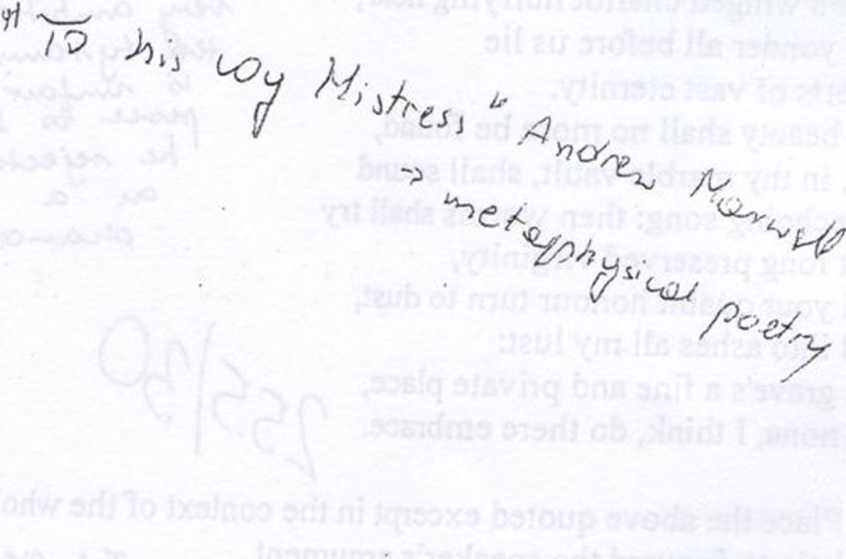41844 Obraz0009 (2)
I Identify the following excerpts (provide tlie title, the nanie of the author - when applicable -and the name of the literary period to which a given work belongs). Answer one accompanying ąuestion in approximately 100 words.
1)
To-morrow, and to-morrow, and to-morrow, Creeps in this petty pace from day to day To the last syllable of recorded time,
And alt our yesterdays have lighted fools The way to dusty death. Out, out, brief candle! Life's but a walking shadow, a poor player That struts and frets his hour upon the stage And then is heard no morę: it is a tale Told by an idiot, fuli of sound and fury, Sisnifying nothing.
V
What is the speaker’s attitude towards the knowledge of the whole work).
■>
u>
H

Jht ^
(2
A/
i
A/
* 0 .
* °^ f /
(Bass y
Ot
Q Q
UfYs ff GL
* Vww - *
c^bŁrt
Yenon^'^'^ - /
2)

But at my back I always hear Time's winged chariot hurrying near; And yonder all before us lie Deserts of vast eternity.
Thy beauty shall no morę be found, Nor, in thy marble vault, shall sound My echoing song: then worms shall try That long preserved virginity,
And your ąuaint honour tum to dust, And into ashes all my lust:
The grave's a fine and private place, But nonę, I think, do there embrace.
Place the above ąuoted excerpt in the context of the whole poem. Expiain in what way(s) images evoked here help to forward the speaker’s argument.
3)_
His voice was merrier than the organ gay On Mass days, which in church begins to play; Morę regular was his crowing in his lodge Than is a clock or abbey horologe.
By instinct he'd marked each ascension down Of eauinoctial value in that town;
For when fifteen degrees had been ascended, Then crew he so it might not be amended.
His comb was redder than a fine coral,
And battlemented like a castle wali.
lULyl
__~Fhci Musi 'i—^
His bill was black and just like jet it shone;
Like azure were his legs and toes, each one;
His spurs were whiter than the lily flower;
And plumage of the bumished gold his dower.
This noble cock had in his govemance
Seven hens to give him pride and all pleasance,
Which were his sisters and his paramours ‘
And wondrously like him as to colours,
Whereof the fairest hued upon her throat
Was called the winsome Mistress Pertelote.
Who is described in this excerpt? To what extent is this text a parody of the medieval romance?
O/nt < cl lilsr
Wyszukiwarka
Podobne podstrony:
41844 Obraz0009 (2) I Identify the following excerpts (provide tlie title, the nanie of the author -
Obraz0009 (2) I Identify the following excerpts (provide tlie title, the nanie of the author - when
Obraz0009 (2) I Identify the following excerpts (provide tlie title, the nanie of the author - when
Obraz0003 (3) I Identify the following excerpts (provide the title, the name of the author - when ap
Obraz0003 (3) I Identify the following excerpts (provide the title, the name of the author - when ap
Obraz0003 (3) I Identify the following excerpts (provide the title, the name of the author - when ap
72444 Obraz0004 (3) 1 Ićcntify the tollowing excerpls (p:ovide the titic, the name of the author - w
Obraz0010 (2) uU ] Identify the following excerpts (provide the title, the literary period to which
76367 Obraz0015 III Identify the following passages (give the title, the name of the author and an a
Replication Features and Issues The following sections provide information about what is supported a
DSC04977 12.2 For each of the following situations, identify the response variable
Host Na mes Host names are used in virtually all TCP/IP environments. The following list provides a
Methods of energy input In a generał electromagnetic system we can identify the following methods of
test 2 literatura brytyjska Identify the sources for the followng fragments (give the author, title
więcej podobnych podstron